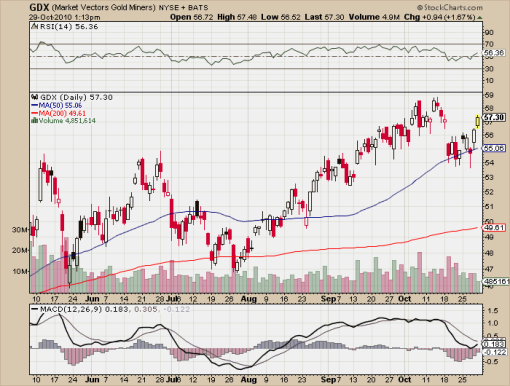October 2010
Monthly Archive
October 29, 2010

Coming soon to The PPT, we will be upping the ante with our new trading room 12631. Basically, in a nut shell, I took my best swing traders (Chess, RC) on iBC and appointed them to The PPT, as Chief of Operations, with regards to guiding in and out of ideas. As much as I would like to do it, I simply do not have the time. Plus anyway, my style is not conducive to some of you five figure Zeeco types. Trust me when I tell you, the service will be value added, to the extreme, for a ludicrously low price point. Unfortunately, this service will be closed to non PPT members for two reasons.
1. We already have a large community inside The PPT, with over 1,500 subscriptions to date.
2. 12631 will be using The PPT’s algos to find ideas and help users maximize its power.
Interesting, he’s trying to monetize a trading room. Now I haven’t followed RC’s nor Chess’s track record, so I have no idea whether they are hot hands or not. One would assume, that since they are being touted in this launch, that they are hot hands. I would also assume that they are being cut into a share of the profits.
What then of the two quant systems on iBC: Wood and Danny? Wood I know already has a subscription based service, so I’m guessing that he’s hoeing his own row. I’m a little curious as to what Danny’s up to.
Where can I view their [RC & Chess] track records? If I’m to pay for their service, I require information on the quality of their product. Wood regularly updates his systems profitability, Danny, as far as I know, sells nothing currently.
I have seen nothing resembling a track record of results from these chaps as of writing, I’m now expecting something to issue forth. Will said track record, when it appears be third party vetted? A accountant or somesuch, who carrying some legal liability, will vouch for the profitability?
We’ll see.
October 29, 2010
Posted by ducati998 under
silver
Leave a Comment
October 29, 2010

It is often believed that a government budget deficit causes a trade deficit—the “twin deficit” argument. The transmission mechanism from budget deficit to trade deficit is supposed to operate through interest rates and currency appreciation.
The fallacy of believing that interest rates are driven by monetary policy, rather than the Pure Rate of Interest.
First, borrowing by government supposedly raises domestic interest rates as the budget deficit “soaks up” domestic saving. Rising interest rates increase the foreign demand for the currency, causing currency appreciation, thus generating a trade deficit.
True, in an economy that runs on a commodity money system. Obviously untrue where government can create money to artificially suppress the money interest rate.
Further, maintenance of high interest rates is claimed to be necessary to maintain the “capital flow” required to finance the trade deficit and the budget deficit, depressing long-term economic growth.
Again, in a gold standard economy, true, when talking about financing deficit spending. Untrue with regard to long term economic growth. High money interest rates do not suppress economic growth: they ensure that only the most profitable companies have access to capital, the higher cost of capital eliminating marginal firms. The high returns ensure that the most urgent consumer demands are met.
The country is said to be a “prisoner of international capital markets”—that “force” high interest rates and low growth on the country. However, the understanding developed above allows us to critically examine such claims.
Well the summary is incorrect, thus the reasons promulgated as an explanation will also be incorrect.
First, budget deficits do not “absorb” private saving and do not put upward pressure on interest rates (thereby crowding out private spending).
Indeud, not where the government can simply create money. However, where there is a fixed quantity of money, and the only way to access said money is via debt or earnings, financing deficit spending will most definitely absorb private saving and lead to higher money interest rates, assuming certeris parabis, no change in time preference.
Indeed, in the absence of central bank intervention (to drain excess reserves), a budget deficit places downward pressure on overnight rates because it leads to a net credit of banking system reserves.
As the government debases the money through increased creation. Theft essentially.
As already discussed, a sovereign government on a floating rate does not really “borrow”, hence, cannot absorb private saving when it deficit spends.
No, it simply inflates, and expropriates from its prisoner population.
Rather, budget deficits allow for positive net saving of government liabilities denominated in the domestic currency by the non-government sector.
And we have a choice in this decision? Of course not, the government simply steals your property, and then churns propaganda rhetoric like this nonsense. Obviously the auther is a paid for technocrat.
This is initially in the form of net credits to banking system reserves, but sovereign debt will be sold to drain excess reserves (either sold by the central bank in open market operations or by the treasury in the new issue market).
Which is the state of affairs in the current ponzi scheme that Bernanke and Geithner are running on the world currently. You create your reserves for the banks, who then spend the new money purchasing the debt that the government requires to fund its deficit spending. Again, simply creating inflation, destroying the property of all save the power elite.
If a budget deficit is associated with rising overnight rates, this is only because the central bank has decided to raise its overnight interest rate target (called the equilibrium interbank rate in Mexico)—a not infrequent, but discretionary, response to budget deficits. The central bank could instead choose a lower interest rate target no matter how large the budget deficit.
Government however, at some point will be called. Called in the manner of other sovereigns, who, have the power to tell Bernanke et al to go f**k themselves. When paper is no longer acceptable, then the music stops. Two alternatives exist: go to war, or, restructure the economy. Both are ugly choices.
October 29, 2010


First Solar’s quarterly gross margin was 40.3%, down 8% from the second quarter of 2010. The decrease was the result of increased low-margin engineering, procurement and construction system sales, lower Module ASPs and higher cost per watt. Net income was $176.9 million in the reported quarter compared to $153.3 million in the year-ago quarter.
Beat on earnings, gave good guidance. I feel an over-reaction in the shares. I may buy some long for a trade.
*Update: Buy long @ $137.93
October 29, 2010
Posted by ducati998 under
inflation
Leave a Comment

The figures are from the Central Bank of China:
Money and Quasi Money Jan 2009 – 496135.31
Money and Quasi Money Sep 2010 – 696384.86
That’s a 40% expansion in the money supply. If you’re going to inflate, hell yes son, do it properly.
Dollar issuance by the United States is “out of control”, leading to an inflation assault on China, the Chinese commerce minister said in comments reported on Tuesday.
“Because the United States’ issuance of dollars is out of control and international commodity prices are continuing to rise, China is being attacked by imported inflation. The uncertainties of this are causing firms big problems,” Chen was quoted as saying by the official Xinhua news agency.
Chinese officials have criticised U.S. monetary policy as being too loose before, but rarely in such explicit language.
Well no-one made them peg to the dollar. China by pegging to the dollar will of course mimic US monetary policy, which, for the last 60yrs+ has been non-stop inflationary.
Of course the consequences of a Chinese bust will take down Australia and NZ, who haven’t really felt the full force of the bear, but, it would seem that it’s only a matter of time. Bon chance.
October 29, 2010
October 28, 2010
Posted by ducati998 under
flip-flop-fly
[4] Comments

“The Fly” has decided to turn over a new leaf and usher in an era of positivity onto iBankCoin. Gone are the days when I’d drink black smoke and metal. “The Fly” is no longer interested in killing many of you and will not ban anyone either. From here on forth, iBankCoin will serve as a sanctuary of sorts (very zen-like) for the financial world.
Let’s see how long that lasts.
Caught him. flippe-floppe-flye made a critical error tonight, he was present in person on his blog while I was around. Of course, I took the opportunity to call him the fraud that he is. How long would he stick around to take the heat? Well not that long, he is after all a wanker.
The Fly says:
October 28, 2010 at 10:11 pm
The stock need to close above $3, not $1.80. And, the short interest has decreased by 10% over the past 6 months.
I’ve played these convert deals before and they worked. See MVIS
Reply
duc says:
October 28, 2010 at 10:20 pm
flippe-floppe,
An opportune moment then to remind you that you still owe me $10 from a wager that was made and has been outstanding foe close to 4yrs now. Surely, a professional money manager, such as yourself, can afford to pay such a measly sum, if only for the sake of your pride.
jog on
duc
duc says:
October 28, 2010 at 10:28 pm
flippe-floppe,
You are being somewhat disingeneous regarding MVIS warrants: you were of the opinion that the dilutive effect was going to be a positive for MVIS. Of course, it tanked. Which earned me, in part, my $10 wager. Now, time to pay-up olde chappe.
jog on
duc
Reply
The Fly says:
October 28, 2010 at 10:29 pm
I sold my MVIS above $4. And, prior to warrant conversion, I did sell much, but not all, of said warrants.
Reply
duc says:
October 28, 2010 at 10:32 pm
Back in the day when you claimed to own so many shares that you would have been required to register as a 5% holder of company stock – of course, there was no such filing.
Pay-up.
jog on
duc
The Fly says:
October 28, 2010 at 10:34 pm
Why would I need to file if the shares were held in indiv accounts? You do know the difference between pooled accounts and not, no?
I’ve paid for our bet many times over with time wasted on your comments.
Reply
duc says:
October 28, 2010 at 10:39 pm
flippe-floppe,
So, you, big-time professional money manager, when you execute a trade, duplicate said trade into 100, 500, etc individual accounts?
Classic.
Pay-up. Before I start charging you interest on 4yrs of welching.
jog on
duc
Le Fly says:
October 28, 2010 at 10:41 pm
The manner of which my trades are executed are none of your concern.
Reply
duc says:
October 28, 2010 at 10:43 pm
flippe-floppe,
Of course how you execute trades is an issue – when it goes directly to your credibility old chap.
Incidentally, don’t you feel a fraud claiming reponsibility for Jeremy’s work in creating the PPT, after all, you are simply the marketing vehicle…no?
jog on
duc
Le Fly says:
October 28, 2010 at 10:46 pm
What would you call a person such as yourself? I am trying hard to remain calm here and out of the woodwork, you come.
I believe santa claus aka god is sending me a sign
Not that i need to explain myself, but i created all ppt formulas. Jeremy coded them and is an immense asset to me.
Reply
duc says:
October 28, 2010 at 10:51 pm
flippe-floppe,
Nonsense.
In the early days of the PPT, you didn’t even take the trades thrown up by the algo’s. This is essentially because you [i] didn’t understand it [ii] didn’t have any faith in it.
jog on
duc
NOT SO FAST, FUCKFACE…”
YOU’VE BEEN BANNED!
Send appeals to: jeremy@ibankcoin.com
(Redirecting…)
Not long at all. About 15mins. Now, periodically, I have vists from the iBC faithful, Wood, Jake, Danny. Interesting to see their reaction to the truly lame fight olde flippe-floppe-flye managed to put-up.
October 28, 2010


Found this cycle of deflation for analysis.
Starting at the peak of inflation, we have excess money + credit creation in the form of debt. For inflation to cease, and a deflationary cycle predominate, we must see total money decrease. That means a contraction in credit, which, built on a fractional reserve system will trigger a geometric contraction in credit.
With the residential real estate crisis, that triggered this credit contraction and the bank runs in 2008, we did indeed enter a deflationary cycle. However, via monetary and fiscal policy, pseudo-private sector banks that were at risk of failure, had their contracting credit exposures assumed by the Federal Reserve, which expanded their Balance Sheet, and the Federal Government, which expanded the public debt. These combined actions have essentially frozen the deflationary cycle in its tracks, and, reignited an inflationary cycle.
We do indeed see devaluation. Devaluation is inflation. Therefore, I’m at a loss as to why an analyst, seeking to illustrate a deflation, would list inflation as a catalyst in an already existing deflationary cycle.
Pretectionism and Tariffs are necessary, when, due to your devaluation, competitors are devaluing in competition as they seek to compete on consumer prices, which in real terms, essentially show no change.

The final stage, seen in the diagram as plant closings and debt defaults, will, this time be sovereign governments, that have expanded their liabilities far in excess of their ability to pay. All debts are, and can only be extinguished with real goods/services. Paper, simply does not qualify. Thus, far from being near the bottom, we are again near the top in the inflationary cycle: the question is simply, how long can government keep the ponzi scheme going? When the bubble [US Treasuries] bursts this time, the crash will be possibly the most brutal in history.
October 28, 2010

The current spread over the last 12mths is QQQQ +15% over DIA. The two, generally track each other quite closely. Obviously AAPL, GOOG, AMZN, NFLX are exerting an undue influence.
Therefore, the potential trade is Long DIA and Short QQQQ. The risk is that this loses on both legs, or, the spread continues to widen.


October 28, 2010
Posted by ducati998 under
motorcycles
Leave a Comment
« Previous Page — Next Page »


















